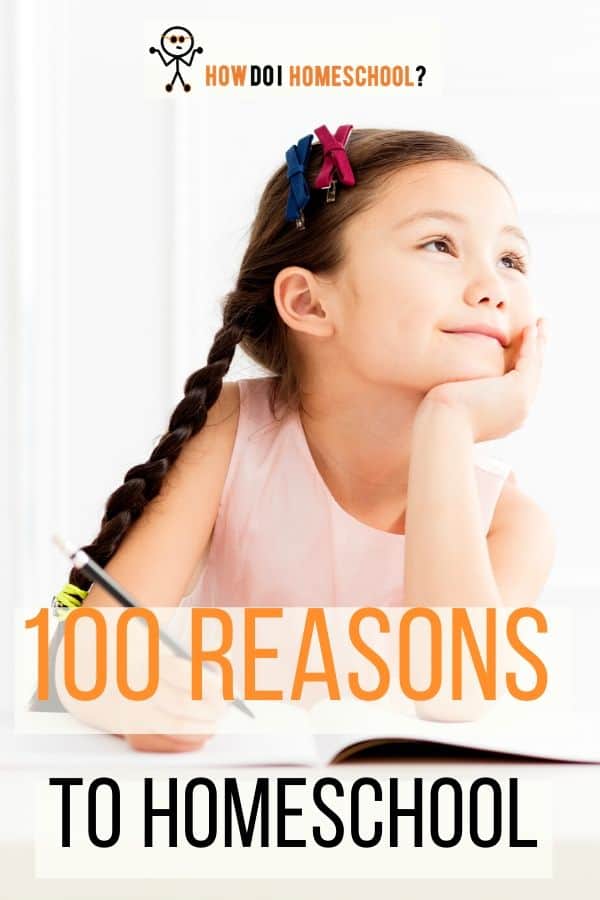Why do some people go to all that trouble and educate their children themselves? Why not take the easy route and send your children to school, especially as it’s already funded in so many instances? It’s not easy to understand sometimes, but here are 100 reasons to homeschool your child. By the end of the article, you’ll be able to see why this educational pathway has grown so much in popularity of late!

I hope you enjoy reading this blog post. If you want to do my course on how to homeschool, click here.
Below we’ll break up the reasons for homeschooling into 7 categories, namely:
- Social Reasons
- Religious (Christian)
- Physical
- Relational
- Mental
- Academic
- Practical
Let’s dive in and get started!
Social Reasons to Homeschool Your Child
1. A home learning environment will generally have far less peer pressure compared to schools.
2. Parents can spend more time guiding their children in moral issues. Not surprisingly, parents usually give their children better examples than their peers.
3. Homeschoolers become adept at interacting with a wide variety of age groups as they generally spend more time in the community with people of different ages. They also might have large families that allow children to interact with older or younger siblings.
4. When children homeschool, they find more opportunities to interact with the community. This allows them to have more input into the community practically. For example, they have time to help their elderly neighbors with their lawn or look out for others on their street who may be experiencing difficulties. As a Christian, there’s also plenty of good opportunities to share the hope you have in Jesus.
5. Sometimes, a good reason to homeschool is to get away from all the deleterious influences in school, like exposure to drugs. In 2014, 7% of American youths aged 12-13 took an illicit substance; homeschooling helps reduce contact with negative peer influence and helps increase contact with (hopefully) more positive influences, such as parents.
6. Similarly, there’s less exposure to smoking and influences who would encourage it. But, even if a homeschooler were exposed to smoking, parents are often present. They can quickly talk children through the sense of the action and create informed children, rather than letting children traverse the situation by themselves.
7. At home, there are more opportunities to teach kids about the wisdom around alcohol usage. Drinking isn’t wrong, but teenagers can easily form bad habits around headstrong and unrestrained youth in school.
8. Homeschoolers have less exposure to bullying and don’t become hardened, as is sometimes the case in school.
9. While homeschoolers aren’t always better behaved than their school peers, they certainly have gained a reputation for it. So many times, I’ve heard of children being complimented on their manners only for the complimenter to find out they are homeschooled. People are surprised when children are so well behaved, and that stands out!
10. Less sexual pressure, so children don’t become as sexualized. Peers in public school often encourage each other to become more sexualized by looking at music videos or other sexualized media images together. In contrast, home-educating parents can properly teach their sons how to pursue a woman in a Christlike manner. This will lead to less premature sexual intimacy and a solid basis for starting a loving and respectful marriage. This is one of the top reasons to homeschool your child, as this advantage can lead to a vastly different, and hopefully happier, marriage with less separation and divorce.
11. Less exposure to sexting and pornography. A lot of pornography is first encountered at school through peers who share and reshare images or encourage the sharing and resharing of images.
12. Avoid bad school cultures by homeschooling. Some schools have endemic problems. For example, (1) those recently exposed in the Royal Commission into Institutionalized Child Abuse, (2) a culture that frowns on its Christian heritage, or (3) poor facilities with demountable classrooms that are cooled insufficiently.
13. Children at home don’t need to suppress their personal identity to fit into the crowd.

14. Homeschooling generally lets the breadwinner spend more time with their children, which increases bonding in a family. As John Crudele said, ‘Children spell love ‘T-I-M-E’.’
15. It lets you choose who your kids socialize with. Parents can encourage helpful relationships and discourage unhelpful ones.
16. Homeschools have more time to effectively lobby political groups and stand up for causes they value.
17. Because Christian homeschoolers can spend a decent amount of time learning Biblical values, this means they can model their behavior off scriptural values they know so well.
18. Instead of seeing teachers and authority figures as something to separate themselves from or rebel against, homeschoolers love their teachers as these are usually their parents! This means they don’t have problems sticking their hands up to answer questions in college or talking to their professor after the lecture.
19. Homeschoolers have more mature and well-adapted behaviors. According to CBN News, ‘Dr. Thomas Smedley … conducted a study in which he administered the Vineyard Adaptive Behavior Scales test to identify mature and well-adapted behaviors in children. Home learners ranked in the 84th percentile, compared to publicly schooled students, who were drastically lower in the 23rd.’
20. At home, children learn in a less judgmental environment. Their peers do not persecute them if they do well, as sometimes occurs in school. This means a homeschooler is more likely to retain more of what they’ve learned. In addition, they’re not hesitant to answer a question as parents don’t ridicule them for wrong answers.
21. Contrary to popular opinion, homeschoolers are generally better socialized than schoolchildren. When they’re not, it’s usually because their parents don’t value socialization – but this is rare from the many research articles on this topic.
22. Homeschoolers ‘converse with adults with more ease and poise on both serious and trivial matters than their public school counterparts‘ [Meighan cited in Seago, J. (2012)].
23. More time to talk through deep, controversial issues arising in everyday life. Having time to do this is sorely lacking in the lives of most 21st century people. Therefore, homeschools provide an indulgent environment where children can do this at their leisure.

Religious (Christian) Reasons
24. Parents have more time to demonstrate their religion to their children through actions. In a homeschool, children see their parents’ faith in action. For example, you can take your children with you to teach English to a refugee or feed the poor in a soup kitchen.
25. Homeschools let parents explain how Christian and secular worldviews differ. In public schools, this isn’t usually done completely or accurately. However, correctly explaining the difference between beliefs creates informed children who can spot argument fallacies a mile away.
26. Homeschoolers imitate their parents more. Because homeschoolers have fewer competing moral examples (like those coming from peers and teachers), they copy their parents and go to them for guidance more often.
27. Parents can employ a Christian worldview that can saturate the hearts and minds of their children with more effectiveness. This is done with more difficulty when children are in public school as public schools try to instill a humanist, secular worldview.
28. Children don’t follow bad role models like Brittney Spears or Tiger Woods, as they’re generally less influenced by popular culture. In a homeschool, a parent can monitor and help children choose their sources more wisely.
29. Sometimes schools teach things because they’re politically expedient, not because they’re the best things a child should be taught. Unlike public schools, homeschools can teach children without giving political lip service to other religions. Also, homeschools don’t need to submit to Enlightenment ideals, commonly taught in public schools around America. Teaching without the hindrance of giving political deference is a great reason to home educate.
30. Homeschooling parents can teach Creation and Evolution arguments in the manner they see fit.
31. Parents can teach the philosophy to which they want to subscribe. They don’t have to teach using self-actualization and Freudian theories, which typify teaching theory.
32. Teach children a biblical view of sexuality.
33. Parents can propagate their beliefs through homeschooling more easily compared to public schools. This was shown in the Gen2 Study, where homeschoolers were much more likely to follow their parents’ beliefs.
34. Parents can teach children that people don’t need to follow the crowds’ way of doing something. Therefore, homeschoolers learn to make up their minds on issues themselves instead of following the crowd like many people choose to do. For this reason, homeschoolers make great entrepreneurs!
35. Because homeschoolers have an education where they learn to love learning, they make great college students who aren’t afraid to answer the professor’s questions. At college, they also hold more spiritual leadership roles. (Galloway and Sutton, 1997).

Physical Reasons
36. Homeschoolers tend to get less tired because they can sleep more. Tiredness is a real killer of learning. Young schoolchildren are often tired after their long day, making them irritable and difficult to control when they get home. Teenagers should also sleep in longer than they do. When schools force teenagers to get up early, they don’t usually make up the time later in the day as it’s hard to get to sleep early if you’re a teen. Thankfully, homeschooled adolescents can sleep in when most children are getting to school. Rested minds mean increased receptiveness which is great for their academic achievement. Homeschooled teens were found to sleep for 8.5 hours and school teens for 7 hours (teens should be getting 9 hours of sleep a night). (Dr. Lisa Metlzer’s study).
37. Homeschoolers have better opportunities to do an elite sport. For example, I regularly cycled for a couple of hours a day with my family. This was done during school hours as we trained for the State Championships.
38. Classrooms don’t always have a variety of spaces like stools, couch areas, and open, outside places. In a homeschool, you can study anywhere – even the library if you fancy a change of scene!
39. Homeschooling parents can pick when their kids start formal education. This is a great reason to homeschool your child as starting a child on formal education too early can be a bad move and embitter them towards learning. Instead, parents can wait until children exhibit a desire to learn before they start formal homeschooling. (Most homeschools only start their five-year-olds off with only one hour of homework a day!)

Relational Reasons
40. Because homeschoolers are more alert and less worn out by the day’s end, they’re not as irritable when they speak to their parents.
41. Homeschoolers are far less peer orientated as bonding between parents and kids hasn’t been cut short at young ages.
42. In a homeschool, the family also bonds together better because they spend more time together. They have more practice at getting along, creating more peace.
43. I know of so many homeschoolers who testify their relationship with their siblings is so much better due to homeschooling. They fight less and play together in a friendly manner more. This was also the case in my family.
44. A parent can determine their child’s learning style and academic, social, and emotional needs better than a teacher because parents spend more time with their children. This leads to good academic results and a good academic experience.
45. A homeschooler’s best friend is more likely to be a family member than a school member. Homeschoolers are not ashamed of hanging out with their parents. And, it’s not uncommon for these teenagers to prefer seeing a movie with their siblings or parents instead of their friends.
46. If children really dislike school, homeschooling can be the vector through which children find themselves extremely thankful to their parents. They interpret the parent’s efforts to homeschool them as outstanding and see their parent’s goodwill towards them.
Mental Reasons
47. Ever wish you got to learn about your favorite subject again? Homeschooling allows parents to become lifelong learners and stimulate their own love of learning alongside their children. Curiosity is the key. (I think it’s also a reason why so many people are falling in love with unschooling these days).
48. When you homeschool, you can sometimes skip subjects your kids find boring or unsatisfying. This can help a lot with motivation.
49. According to one study, homeschoolers have a better self-concept. (Piers-Harris Children’s Self-Concept Scale.)
50. They have lower anxiety levels compared to peers in school. (Piers-Harris Children’s Self-Concept Scale.)
51. Although homeschooled children are not necessarily more loved by their parents than schoolchildren, home learners have more contact with their parent’s love. In a Christ-focused, gospel-centered household, this helps them feel more loved and learn to love others around them better. (Piers-Harris Children’s Self-Concept Scale.)
52. Because home-educated students can follow their interests (through interest-based learning), homeschooling is well suited to bring out your child’s genius.

Academic Reasons
53. Children can find they’re more motivated to do their work when they’re homeschooled. Of course, this doesn’t mean your homeschooler will always be motivated to study, but many parents find homeschooling is a good motivator.
54. A homeschooler doesn’t need to waste time on end-of-school exams. Many people mistakenly believe you have to finish high school to enter the next step in life (often college, a trade, or an entrepreneurial venture). But, homeschoolers can start these pathways sooner. For example, the Harding Family (a Catholic homeschooling family) started 6 kids at college by age 12!
55. At home, students get more chances to train for an entrepreneurial venture or participate in the family business (and learn that trade) as they progress through homeschooling. Perhaps they might continue their family business which they have learned for a long time as they’ve been homeschooled. (See this interview with a homeschool entrepreneur.)
56. Children don’t have to endure and feel discouraged by critical peers. This is less stressful and, therefore, a better learning environment.
57. Home learning is self-paced. Students don’t need to progress at the speed of the slowest student in the classroom. Instead, they can adjust their academic speed to suit their pace.
58. Homeschools can avoid unnecessary tests, and if testing is needed, it can be done in a gentler style. (i.e. instead of sitting kids down for a stressful test, narration is a great way to test comprehension after a passage has been read).
59. Homeschoolers are much more efficient as they have less busywork and wasted time compared to school. They don’t waste time moving from classroom to classroom or doing filler material until the slowest student has caught up to the fastest.
60. Because homeschools only do an average of 3 hours of formal work a day, they don’t get exhausted with too much work.
61. Better academic results. Academic scores are ‘well above public school student’s averages‘.
62. Because homeschoolers spend more time in personal exchanges with parents, parents can tailor their children’s education more closely than schools.
63. As homeschoolers get older, they start teaching themselves (after spending the formative years learning how to teach themselves). Because they have learned to self-direct their study so effectively, they tend to find tertiary education easier.
64. Homeschoolers tend to excel in reading and writing as they’ve had a tremendous amount of time to pursue books in their spare time or during language arts.
65. This is one you’re definitely not going to be able to do in any public school – use the Bible as a textbook!
66. In a homeschool, children can do subjects they might not have been able to do in school.
67. Smaller class sizes mean you have more concentrated, face-to-face time with each child. This means children learn better as they have more time with their teacher. It also means they’re more engaged with the work and will do better.

Practical Reasons
68. A homeschool gives kids an opportunity to do life in a realistic setting, to copy their parents in their day-to-day activities.
69. Fifty years ago, students dissected actual frogs. These days anatomy is done virtually! In a homeschool, you can revert to proper anatomical studies and do anatomy and physiology on real animals if you have pets or live on a farm (or you can do animal dissection studies by getting animal parts from the butcher). Robert Kunzman talks about how one family did animal dissection anatomy on their elk farm. They also learned how to vaccinate, castrate and tend for the elk in other ways.
70. Homeschools have less red tape than schools, meaning you can get things done more quickly than schools.
71. At home, active kids can physically wear themselves out and later concentrate on their studies better. Homeschoolers don’t need to sit still for extended periods like schoolkids. Instead, formal homeschooling only takes 3 hours on average. This can really help kids who have been given the label ADHD.
72. No school travel is needed. This can make days more flexible, and some mothers find their days more relaxing as a result. Antoinette, who lived 15 minutes away from her children’s school, said homeschooling her kids was easier than getting them ready for school dropoff in the morning and picking them up in the evening. She described dropoff and pick-up times as ‘chaos’.
73. Parents can travel more and during school periods. For example, they can make extended trips overseas or engage in missionary work. If you’re a parent who loves to travel, this may be one of your top reasons for homeschooling.
74. Homeschooling is often cheaper than daycare or private school (especially when you have lots of kids.).
75. Not sending your kids to public school saves the government a lot of money.
76. Homeschooling works well for families living in remote places. Home education allows isolated families the opportunity to spend time with their children AND give them a great education.
78. Because many homeschoolers have great relationships with their parents, their family involvement later in life is high.
79. In a homeschool, you can improve things when you find a mistake. This is harder in schools where the school doesn’t always have the will or resources to change.
80. Homeschools are a great place to grow ‘transformational leaders‘ and learn leadership skills.
81. Because school takes up such a huge chunk of a family’s week, children don’t always get to spend a lot of time with their parents. Homeschooling gives a family more time for family activities.
82. More time for extra-curricular activities. Want to get your pilot’s license? There’s time for that when you homeschool.
83. Homeschooling is a great way to teach frugality, as kids can closely watch parents make everyday decisions about finances.
84. Don’t have your week dictated by the school roster. Instead, have a flexible, more self-determined lifestyle. For example, you can skip some schoolwork days and make up lost academic hours on other days. Or take a month off at a time, making it up later.
85. Hate fighting the school-holiday masses in your favorite vacation spot? Homeschools get more holidays, and families can take these vacations outside of school holidays.
86. Because you don’t need to transport your kids to and from school, you can avoid peak hours and stressed moms in SUVs picking up their children.
87. Homeschooling can be cheaper than sending multiple children to an expensive grammar school. Parents can also cut costs by choosing a free homeschool curriculum like Easy Peasy.
88. Children can develop their natural capacities more than they would be allowed to in school. This is because schools weren’t designed to accommodate the range of capacities humans have.
89. You can start educating your children earlier if you wish.
90. Teach more life skills and practical skills at home.
91. Homeschoolers can help their parents with yard work, growing vegetable gardens, and trimming hedges. This can make the garden beautiful and help out with the bills as families grow their own food at home.
92. Students can learn animal husbandry, which can count as an educational subject at home.
93. Parents can teach sex education with more gravity at home. For example, parents can stress the importance of life from conception and how important the marriage relationship is. This shows children the correct place sex should have in their lives.
94 – 100. If you’re interested in homeschooling because your child is disabled, has special needs, or is gifted, see Disabled, Gifted, and Special Needs Reasons to Homeschool your child for more reasons!

Concluding the Reasons to Homeschool Your Child
There are many wonderful reasons to homeschool your child! Even though home education may be more work initially, you’ll probably find your decision to homeschool gives you so many more advantages than disadvantages. Remember that homeschooling is a tool, and if it is used lovingly, it can lead to great family life!




Shame on the writer for listing all these wonderful reasons to homeschool then list #32 “Avoid school propaganda that normalizes LGBTI sexuality”. The “T” in those letters stands for transgender, that has nothing to do with sexuality. If you’re going to insult something please know what you’re talking about. Also, mentioning the teachings of Jesus yet suggesting to parents that it’s a good thing to deny acknowledging people of all kinds is not how Jesus saw others. They were all his children. There’s no propaganda involved with letting kids know that the world is full of all kinds of people who love in all kinds of ways. Love is a wonderful thing and we should all wish to have positive and healthy relationships. That’s too bad you think it should be limited to what only you’re comfortable with and that others should also raise youth to think the same.
Hi Sylvia, Thank you for commenting. I’m sorry you’re hurting on this one. I do accept all people, but I don’t accept all their ideas. Jesus accepted all people, but he didn’t accept their ideas (he called someone a fox and John called some people a brood of vipers). I have altered the wording of #32 in response to your comment.